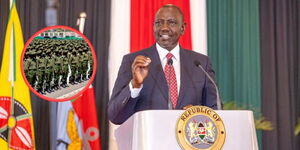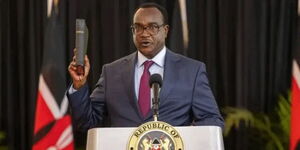Speaker of the Senate Amason Kingi on Wednesday confirmed the reception of the documents on Deputy President Rigathi Gachagua's impeachment pending the hearing at the Senate.
In a Gazette Notice dated Wednesday, October 9, Kingi noted that the Senate convened for the hearing of charges in the proposed removal of Deputy President RigathiGachagua on the same day at 9:30 am
"PURSUANT to Article 145 (3) (a) of the Constitution and Standing Order 78 (1) of the Senate Standing Orders, I appoint the sitting of the Senate of Wednesday, 9th October, 2024 at 9.30 a.m. as the sitting convened for the purpose of hearing the charges in the matter of the proposed removal from office, by impeachment, of His Excellency Rigathi Gachagua, E.G.H., Deputy President of the Republic of Kenya," the notice read in part.
Kingi's notice follows the National Assembly's move by 281 MPs who voted in support of the impeachment motion. The threshold set by the constitution is at least 233 MPs.
During the seating, the Senate is also expected to decide how the case will be heard, either through a Committee or the plenary. The Constitution treats the Senate as the trial House.
In the documents sent to the senate by the clerk of the National Assembly Samuel Njoroge and seen by kenyans.co.ke, the National Assembly provided 26 copies of documents and evidence in support of the motion against Deputy President Rigathi Gachagua.
"Attached herewith, please find a message in respect of the Resolution of the National Assembly on its approval of a Special motion on the Removal from office, by impeachment, of H.E. Rigathi Gachagua, EGH, Deputy President of the Republic of Kenya", reads part of the document by the National Assembly Clerk.
Among the provided documents to the Senate include Mwengi Mutuse's notice of Special motion and affidavit dated September 26 and received September 27, electronic evidence of the Special motion contained in a flash disk, public perception advertisements and reports, responses to the Special Motion by the Deputy President among others.
Before the vote that led to the Impeachment, Members of Parliament across the political divide put a case against the deputy president, tearing into the defense that he laid before the House.
In Mutuse's special motion against the DP, the MP preferred 11 charges, upon which MPs voted to send President William Ruto’s principal assistant home.
The charges include undermining devolution, a gross violation of the constitution, undermining the President, irregular acquisition of wealth, publicly attacking a judge, intimidating the acting Kemsa CEO, promoting ethnicity and insubordination to the president, among other charges.
The National Assembly Speaker Moses Wetangula gave the Deputy president a chance to defend himself a move that was able to convince only 10 MPs who retraced from their previous votes of supporting the motion to vote against it. All eyes are now on the Senate which will either save Gachagua from impeachment or hit the last nail on Gachagua's impeachment coffin.












